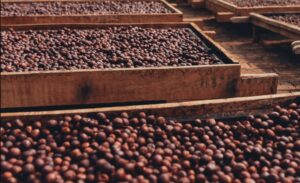Natural Process Coffee Espresso

Natural Process Coffee Espresso
Main Contents
- A. Intro to Natural Process Specialty Beans
- B. What defines naturally processed coffee?
- C. Using naturally processed coffees for espresso
- D. What about milk-based drinks?
- E. Guidelines for Optimal Use of Natural Coffees in Espresso
- F. Optimizing Extraction for Naturally Processed Coffees
Natural Process Coffee Espresso

A. Intro to Natural Process Specialty Beans
Coffees with natural processing will unlock distinctive flavours but it demand pairing with the proper brewing.
Espresso brew will highlights this natural processing impact. Naturals, with their fruit and body, excel as espresso and key essential is balancing fruit and acidity levels.
Lower densities and finer grinding help to control sweetness and adjust dosage down to prevent overpowering saccharine notes.
Coffee professionals must understand the interactions to open new dimensions.
Only through experience doing tests and trials on naturals in espresso, in order to reach their full potential.
In the end, processing inspires creativity – if used thoughtfully.

B. What defines naturally processed coffee?
There are various stages of natural processing.This method, also known as dry processing, boasting simplicity in execution.
It requires precise application to achieve consistent excellent results with natural processing methods.
The process involves several straightforward steps:
- After collection and sorting, cherries are spread on raised terraces or patios to sun-dry.
- Cherries remain intact, encompassing both fruit and mucilage.
- Drying continues until the cherries reach a moisture content of 11 to 12%.
- Regular turning of cherries is essential during drying to prevent mold growth.
- Once dried, cherries undergo pulping, hulling, and transformation into green coffee, ready for export.
When executed adeptly, natural processing yields captivating and “graceful” fruit flavours with enhanced body and a velvety mouthfeel.
An increase number of cafes and roasters are incorporating naturally processed coffees into their menus.

C. Using naturally processed coffees for espresso
Naturals and espresso prove a powerful pair. Their fruit and body accentuate espresso’s concentrated strength.
Roast mastery. Naturals forgive more, yielding complexity even in large batches. Their low temperature roasting better balances sweetness and fruit.
For baristas, naturals deliver that sweet spot between approachability and nuance. Their well-rounded flavours appeal broadly while still capturing coffee’s specialty spirit.
For fail-safe fruit and sweetness, nothing satisfies like a natural.
Their roast-friendly nature makes naturals a trusty partner for espresso perfection, batch after batch.

D. What about milk-based drinks?
Milk meets its match with naturals’ lush texture. Naturals’ sweeter, smoother nature though? A cappuccino match made in heaven.
Just let naturals’ affinities shine. Their plush body and fruit marry dairy’s richness, blending familiar flavours customers crave.
Of course, dialing in proper extraction remains key – even naturals go sour when under-extracted.
For complete coffee flavour in every creamy sip, no processing pairs quite like naturals. Their natural qualities take the guesswork out of milk pairings.

E. Guidelines for Optimal Use of Natural Coffees in Espresso
The importance is to accentuate its inherent characteristics.
It is essential to taste and understand it, regardless of the preparation method employed.
There is this specific consideration to point out that the degassing period for natural coffees tends to be longer than other processing methods.
Washed coffees typically take around two weeks to fully degas, where naturally processed ones usually require about three weeks. This extended degassing period contributes to an easier extraction of the coffee’s aromatic nuances.

F. Optimizing Extraction for Naturally Processed Coffees
For natural coffee beans in espresso form, a longer extraction time is recommended to accentuate their inherent sweetness. They tend to retain a slightly higher moisture content, employing a slightly finer grind size proves effective in achieving more delightful and consistent flavours.
Augmenting the yield of naturally processed coffees can further enhance the sweetness and fruitiness experienced in the cup. With a ground coffee to water ratio: 10g to 25ml and making adjustments accordingly.
In recent years, natural processing methods have gained momentum within the specialty coffee sector. A growing number of coffee establishments and roasters now feature naturally processed coffees in both filter and espresso offerings.
Particularly in the case of espresso preparation, a distinct approach is crucial for naturally processed coffees to truly showcase their unique qualities. This tailored treatment ensures that customers encounter entirely novel flavour profiles, allowing the distinctive characteristics of these coffees to shine.
It’s time for you to brew some Specialty Coffee.
Try our coffees
Every few months we sourced from different countries to select the best farm coffees harvest. We gently micro-batch drum roast all of our coffee beans in our roastery in Singapore. Indulge yourself in our flavourful coffees!
Get our fresh roasted coffee beans on-demand from our Lazada and Shopee stores:
Lazada.sg/shop/soji-coffee/
Shopee.sg/soji.coffee
Or visit our shop at : 38A Beo Crescent Market #01-52 Singapore 169982 (Opening Hours > Click Here < )
Natural Process Coffee Espresso
-
 KIYONZA BURUNDIProduct on sale$10.90 – $89.90
KIYONZA BURUNDIProduct on sale$10.90 – $89.90 -
 BRAZIL SUL DE MINAS (SETE CACHOEIRAS)Product on sale$5.90 – $39.90
BRAZIL SUL DE MINAS (SETE CACHOEIRAS)Product on sale$5.90 – $39.90 -
 COLOMBIA GEISHA BUENA VISTA (Seasonal Harvest)Product on sale$17.90 – $159.90
COLOMBIA GEISHA BUENA VISTA (Seasonal Harvest)Product on sale$17.90 – $159.90 -
 ANAEROBIC KAMALA TANA TORAJA (Seasonal Harvest)Product on sale$13.90 – $119.90
ANAEROBIC KAMALA TANA TORAJA (Seasonal Harvest)Product on sale$13.90 – $119.90 -
 ETHIOPIA MISTY VALLEY G1Product on sale$11.90 – $99.90
ETHIOPIA MISTY VALLEY G1Product on sale$11.90 – $99.90 -
 ETHIOPIA G1 YIRGACHEFFEProduct on sale$7.90 – $59.90
ETHIOPIA G1 YIRGACHEFFEProduct on sale$7.90 – $59.90

